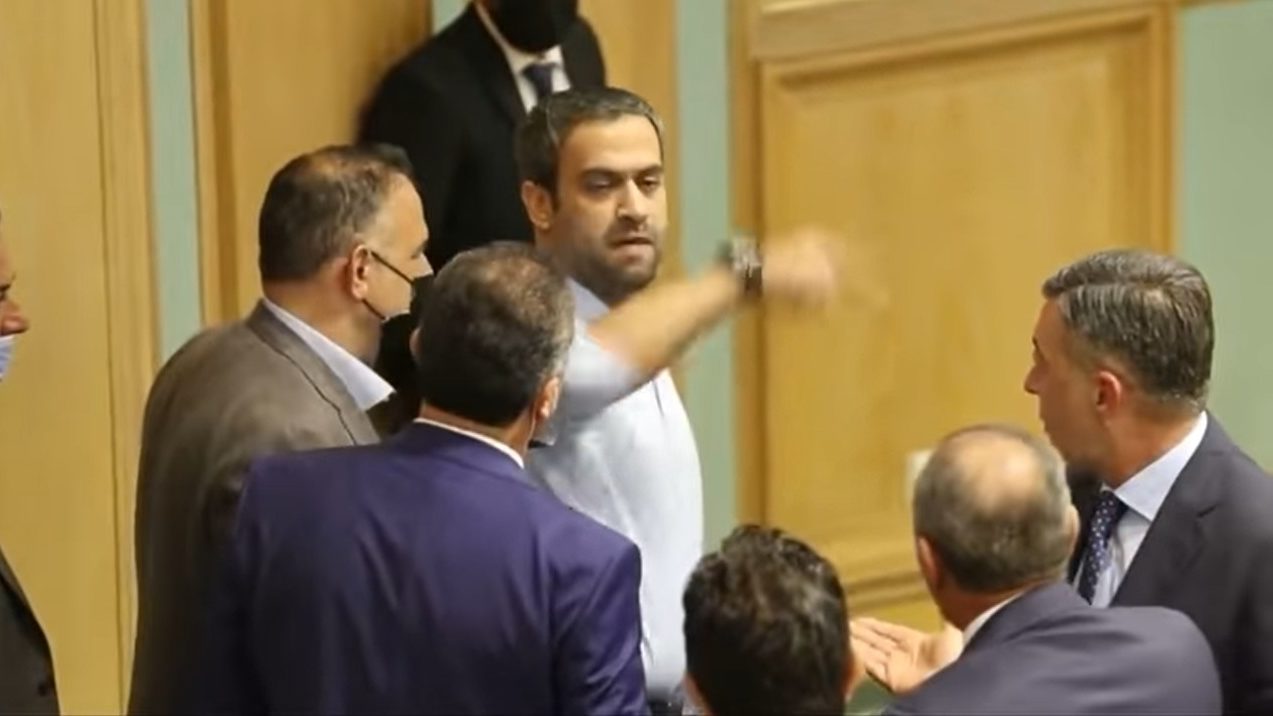Jordan’s Tribal Problems Continue
Dissident legislator’s kindred protest as he comes under fire for criticizing king, establishment
The Hashemite Kingdom of Jordan, one of the most stable countries in the region, is going through internal difficulties as King Abdullah II tries to deal with some troubles with the previously very loyal tribal communities.
While far from the coup initially claimed by an American newspaper, the troubles that began with the house arrest of former Crown Prince Hamzah, the king’s half-brother, have spread to some tribal communities.
The issue with the prince was downgraded to an accusation of “sedition” and tensions were lowered when Prince Hassan, the monarch’s uncle and the elder of the family, held a family gathering where everyone, including Hamzah, pledged in writing their support to King Abdullah. Prince Hamzah’s bodyguards and staff, who had been arrested, were also released, leaving only former royal court chief Bassem Awadallah and a distant relative of the king, Sharif Hassan bin Nasser, still awaiting legal proceedings.
But while the case of the former crown prince was no longer in the headlines, tribal problems continued. Osama Ajarmeh, a member of parliament, was caught speaking ill of the legislature for inaction, especially after the electrical troubles that blacked out the entire country for a couple of hours on May 21.
This angered the speaker of the parliament, who pushed its Law Committee to order a one-year suspension of Ajarmeh. Before the decision was taken up by the full parliament, Ajarmeh’s tribal supporters set up a protest tent.
The Jordanian police took down the tent on May 29 and as a result, Ajarmeh submitted in writing his resignation from the parliament.
In the meantime, Ajarmeh was again caught on video speaking ill of the king, using never before heard nasty language against the monarch. Small protests with tire-burning took place in Ajarmeh’s stronghold tribal area of Naour, southwest of the capital Amman.
Parliament met on Sunday, a day before scheduled, to vote on the resignation and instead voted overwhelmingly to permanently terminate their colleague. Later King Abdullah announced the suspension of the extraordinary session of the parliament, which will not reconvene in regular session until October.
Member of parliament Omar Al Aiasra told The Media Line recent events constituted a “rebellion against the state” and must be dealt with as such. “When tribal protests start shooting at the nation’s security forces, the tribes are becoming destroyers not builders of the state.”
Hassan Barari, a professor of political science at Qatar University who comes from the Ajarmeh tribe, told The Media Line the parliament erred in the way it dealt with a statement made by a member whose right of expression and immunity to speak is protected by the constitution.
“At the same time, I am not with those who want to bring us back to the pre-state period that focused on sub-identities to face the national one. There is a big difference between criticizing the government and denying the historic importance of a central government as a national accomplishment,” Barari said.
Munther Hiwarat, a political commentator, told The Media Line that real democratic change is required.
“It is important to understand what led to these popular protests and the anger that many people have with the state, but what is needed to deal with this issue is to provide a chance for people to express themselves and to feel that they are allowed to share in the decision-making process.”
The monarchy needs to “provide an umbrella for all different ideas and must deal with the root causes of these protests in a democratic way,” Hiwarat said.
Saleh Armouti, a member of parliament for the Islamic Action Front and former head of the Jordanian Bar Association, told Radio Al-Balad, a local station in Amman, that there has been a failure in dealing with the problem of Ajarmeh on all relevant levels.
“The circumstances are complicated and the national interest requires a moment of quiet, national unity and focus on the higher interest of the country,” Armouti said, adding that the problem is not a “storm in a teacup” but runs much deeper.
Meanwhile, Jordan faces another problem, this time concerning the small but influential Christian community.
A street sign from the Bible Society of Jordan congratulating the kingdom on the 75th anniversary of its independence contained a biblical verse. An uninformed Islamic cleric noted that the verse is from Psalms and attacked the municipality of Amman for allowing a “Jewish psalm” to be included in a sign and the Bible Society for acting to “normalize” relations with Israel.
The municipality took down the sign and a spokesman said the city is opposed to any sign that contains words that are “abusive to our culture.”
This brought angry reactions from Christians who felt their scripture − the Old and New testaments − was being attacked. Many progressive Muslims joined the largely Christian tribes to attack the central government-appointed city council.
The strength of the protest led the city’s mayor to visit the head of the largest Christian community, Archbishop of the Orthodox Church Christophorus Atallah, on Saturday. Even that event was not without controversy, as the archbishop denied permission to the Bible Society to speak at the event, leading to the withdrawal of the Society’s director, Munther Neemat, a Catholic, and to the interdenominational board leaving the event in protest.
Mohammad Ersan provided research assistance for this report.


